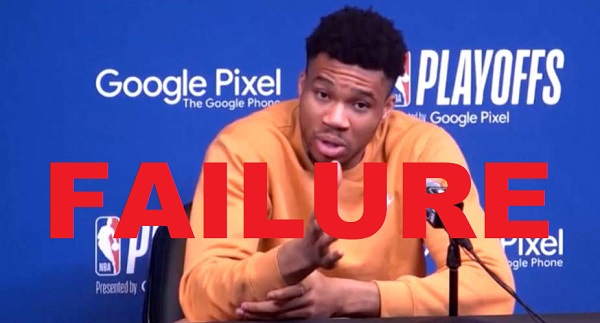The Milwaukee Bucks entered Game 2 of their 2025 NBA Playoffs first-round series against the Indiana Pacers with a chance to even the score after a disappointing 117-98 loss in Game 1. With Damian Lillard returning from injury and Giannis Antetokounmpo expected to lead the charge, hopes were high for a Bucks rebound. Instead, Game 2 unfolded as a showcase of Giannis’ worst tendencies—selfish decision-making, predictable offensive moves, and a failure to adapt—culminating in a 123-115 defeat that put Milwaukee in a 2-0 hole. To make matters worse, Giannis’ postgame press conference remarks doubled down on his now-infamous “there is no failure in sports” speech from 2023, coming across as tone-deaf and out of touch with the gravity of the Bucks’ predicament.
A Stat Line That Masks Selfishness
On paper, Giannis’ performance in Game 2 looks impressive: 34 points, 18 rebounds, 7 assists, and a block in 40 minutes. He shot an efficient 14-of-20 from the field and 6-of-10 from the free-throw line. But numbers only tell part of the story. Watching the game revealed a player who, despite his gaudy stats, played with a tunnel-vision approach that disrupted the Bucks’ offensive flow and played right into the Pacers’ defensive hands.
Giannis dominated the ball far too often, opting for isolation drives against multiple defenders rather than leveraging his teammates. Early in the game, he repeatedly barreled into the paint, ignoring open shooters like Kyle Kuzma and Brook Lopez on the perimeter. The Pacers, coached by Rick Carlisle, were ready for this. They collapsed the paint with help defenders like Myles Turner and Pascal Siakam, forcing Giannis into contested shots or turnovers. Turner, a two-time blocks champion, emphasized the Pacers’ strategy: “Sometimes you’ve got to lose the battle to win the war,” indicating they were content letting Giannis take tough shots as long as they limited Milwaukee’s role players.
This approach worked. While Giannis racked up points, only three other Bucks scored in double digits, with the team’s four other starters combining for a meager 14 points in Game 1—a trend that continued in Game 2. The Bucks’ offense became one-dimensional, relying on Giannis to bulldoze through double- and triple-teams. His seven assists suggest playmaking, but many came late in the game during a desperate fourth-quarter rally, when the Bucks cut a 15-point deficit to two before ultimately falling short. Had Giannis trusted his teammates earlier, the Bucks might have avoided such a deep hole.
Predictable Moves and Defensive Exploitation
Giannis’ offensive game has long been criticized for its lack of variety, and Game 2 exposed this flaw glaringly. His go-to move—lowering his shoulder and charging into the paint—was telegraphed from the opening tip. The Pacers’ defenders, particularly Siakam and Aaron Nesmith, anticipated these drives, positioning themselves to draw charges or force Giannis into awkward angles. NBA tracking data from the regular season showed Siakam defending Giannis for 130 possessions, allowing 47 points on 67% shooting, but in Game 2, the Pacers adjusted, using help defence to clog driving lanes.
Carlisle noted post-Game 1 that Giannis “got to the basket too much,” and the Pacers tightened their scheme in Game 2, fouling strategically and daring Giannis to shoot from outside. He attempted zero three-pointers, a stark contrast to the modern NBA’s emphasis on spacing. His reluctance to shoot from deep allowed defenders to sag off, crowding the paint and limiting Milwaukee’s drive-and-kick opportunities. Tyrese Haliburton, the Pacers’ All-Star guard, capitalized on this, confidently stating that the Bucks’ poor three-point shooting (9-of-37 in Game 1) was unlikely to persist but that Indiana’s pressure would keep Milwaukee uncomfortable.
Giannis’ predictability extended to his defensive effort, or lack thereof. Tasked with guarding Siakam at times, he struggled to keep up with the Pacers’ motion offense. Siakam exploited Giannis’ slower lateral movement, scoring 25 points and creating open looks for teammates. Giannis’ single block was overshadowed by moments of disengagement, particularly in transition, where Indiana’s fast-paced attack overwhelmed Milwaukee’s defence. The Pacers’ ability to push the tempo—something Giannis himself acknowledged as a Bucks weakness—further highlighted his inability to adjust to playoff intensity.
The Blame Falls on Giannis
While the Bucks’ supporting cast underperformed and Lillard shot a dismal 4-of-13 in his return, Giannis bears the brunt of the blame for Game 2’s loss. As a two-time MVP and the team’s undisputed leader, he sets the tone. His insistence on hero-ball tactics stifled the offense and demoralized teammates who were left spectating rather than contributing. The Bucks’ late rally showed what could have been—a balanced attack with ball movement and open shots—but it came too late, largely because Giannis failed to adapt until the game was nearly out of reach. More importantly his passes are still abysmal. Hardly ever in the shooter’s comfortable pocket to receive the pass, usually at the end of the clock, predictable so the Pacers are all over the receiver. No wonder they can’t get them in more!
The contrast with the Pacers’ team-oriented play was stark. Indiana’s seven double-digit scorers and Haliburton’s 12 assists in Game 1 demonstrated a collective effort that Milwaukee lacked. Giannis’ couldn’t overcome a Pacers squad that executed Carlisle’s game plan with precision. The Bucks’ 48-34 regular-season record and fifth seed already hinted at vulnerabilities, and Giannis’ inability to elevate his team in the playoffs—especially after missing last year’s series against Indiana due to injury—raises questions about his leadership in high-stakes moments. It seems the more he gets determined the more foolishly he plays.
A Foolish Follow-Up to “No Failure in Sports”
Giannis’ postgame press conference only compounded the frustration. In 2023, after the Bucks’ stunning first-round exit to the Miami Heat, Giannis delivered a viral speech rejecting the notion of failure in sports. He argued that every season is a step toward success, using Michael Jordan’s six championships in 15 years to illustrate that not winning doesn’t equate to failure. The speech was praised for its perspective but in fact it was incredibly dumb and disrespectful for many reasons outlined here.
But in the context of Game 2’s loss, Giannis’ attempt to revisit this philosophy fell flat. When asked about the Bucks’ 0-2 deficit, he reiterated that “there’s no failure in sports” and emphasised effort over results, saying, “We’re giving everything we have, and that’s what matters.” This response, while consistent with his 2023 stance, felt disconnected from the moment. The Bucks aren’t just losing—they’re being outplayed with Giannis’ flaws at the forefront. Fans and analysts, already frustrated by Milwaukee’s first-round exits in the past two seasons, saw the comments as deflecting accountability.
The 2023 speech worked because it came from a place of reflection after a season-ending loss. In 2025, with the series still ongoing and the Bucks facing elimination, Giannis’ remarks seemed dismissive of the urgency. His analogy to Jordan ignores a key difference: Jordan adapted, developing a jump shot and mastering playoff chess matches. Giannis, by contrast, appears stuck in his ways, relying on athleticism over versatility. Repeating the “no failure” mantra risks alienating fans who see a team failing to meet expectations, especially with a roster built around a perennial MVP candidate.
Can Giannis Redeem Himself?
The Bucks now head to Milwaukee for Game 3, trailing 2-0 in a series that feels increasingly lopsided. Giannis has the talent to turn things around, but it will require a dramatic shift. He must trust his teammates, diversify his offensive approach, and match the Pacers’ defensive intensity. Does the 2021 NBA Finals MVP know what it takes to win a championship or was it an extremely lucky run back then? Recent playoff performances suggest he’s struggling to translate that experience into consistent postseason success.
The Pacers, meanwhile, are brimming with confidence. Carlisle’s defensive adjustments and Haliburton’s playmaking have exposed Milwaukee’s weaknesses, and Indiana’s depth makes them a formidable opponent. If Giannis continues to play predictably and selfishly, the Bucks risk a third straight first-round exit—a far cry from the “steps to success” he preaches.
In the end, Game 2 was a microcosm of Giannis’ current limitations. His physical gifts are unmatched, but his game lacks the polish and adaptability needed in the playoffs. His postgame comments, meant to inspire, instead underscored a refusal to confront the team’s shortcomings. For the Bucks to climb out of this hole, Giannis must lead with actions, not words—and prove that his “no failure” philosophy can coexist with accountability.



